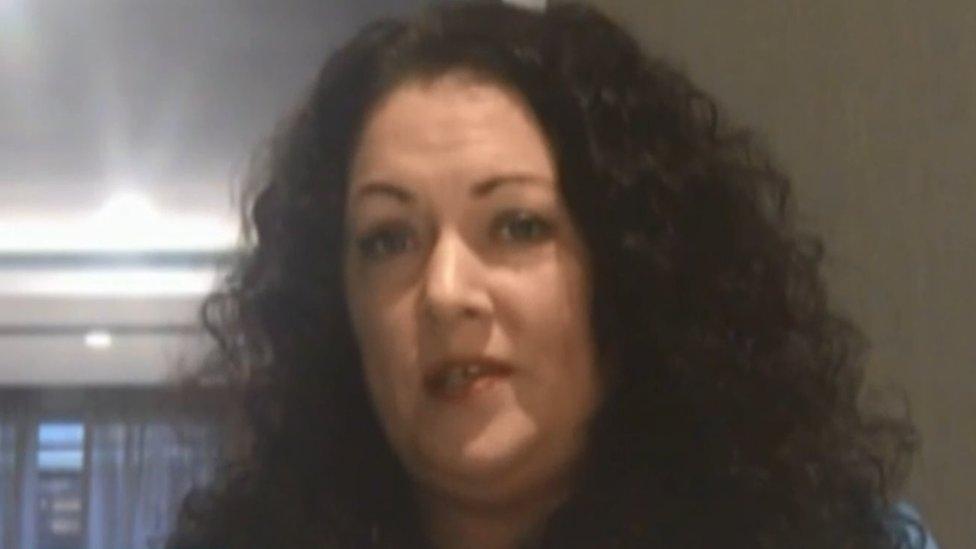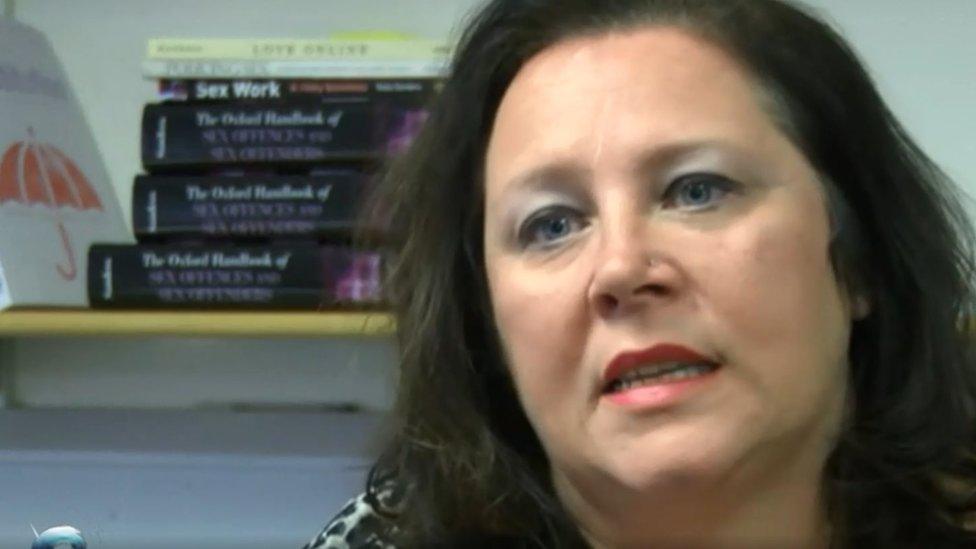Study reveals online sex worker fears
- Published

Laura Lee said some sex workers had a "fraught" relationship with the police
The UK's largest study of online sex workers found more than 80% of those questioned have been a victim of crime.
While levels of violence were far lower compared with street sex workers, instances of stalking and online harassment were prevalent.
The study, by the universities of Strathclyde and Leicester, found that despite high levels of crime, 40% said they would not go to the police.
Workers blamed an "inconsistent" or unsympathetic response by officers.
The two-year Beyond the Gaze study heard from more than 640 sex workers and 1,500 clients.
The report concluded that most sex workers earned less than £20,000 a year, with women making up 73% of the workforce.
Their services ranged from so-called "webcamming" - where clients paid to see performances in front of a camera - to escort services.
Advertising sexual services online is not illegal, with a recent Home Office report, external suggesting there were between 60,000-80,000 sex workers in the UK.
Street prostitution is thought to account for only 3% of the sex market, with the majority of sex workers thought to operate online.

The report found that two-thirds of those asked had been a victim of harassment in the past five years, while nearly half said they feared having their privacy breached and being "outed" as a sex worker to their family and friends.
The report's authors said the police response to the issues was inconsistent and often under-developed, with forces instead focussing on trafficking and street work.
'Fear reprisals'
Co-author, Prof Jane Scoular from Strathclyde University, told the BBC's Good Morning Scotland programme: "We found an increase in the number of online crimes.
"While other types of crimes were lower for this population in terms of violent and sexual crimes, here was quite high levels of internet-facilitated crime in terms of harassment or people using sex workers information without their consent."
Prof Teela Sanders, who also led the research, added: "Persistent emails, persistent phone calls, people turning up at the door of people's homes and some of these had gone on for six, seven, eight years.
"One of the key issues here is that sex workers are often very reluctant to report to the police.
"They fear that either nothing will be done about the issues or they fear reprisals."

Tella Sanders said stalking and harassment were issues of concerns for online sex workers
Sex worker Laura Lee, who has worked in the industry for 24 years, told the BBC's Victoria Derbyshire programme: "The internet can only protect us so far.
"Really the law needs to step up to the mark and so do policing standards.
"I was a victim of violence in Glasgow from a very unstable man, and our relationship with Police Scotland as sex workers is very fraught to say the least, and so I didn't feel there would be any benefit in going forward and reporting him because I didn't feel I would be taken seriously.
"I didn't know how much resources they would throw at trying to apprehend him."
The study also found that most of the sex workers who took part said they would not be involved in the sector had it not been for the internet.
'Stigmatised, marginalised, penalised'
Charlotte Rose, an escort and sex work activist, said there was still huge shame attached to the job.
She said: "I'm stigmatised, marginalised, penalised all the time.
"I've been threatened, I've been blackmailed, I've been evicted twice because of what I do for a living because of somebody else's moral opinion.
"The fact is that you wake up in the morning and go to work nine to five, go home and see your family.
"That's exactly what I do every day. This is just a business for me."
Assistant Chief Constable Dan Vajzovic from the National Police Chiefs' Council said the report's findings were useful.
He added: "The proliferation of the internet has been a game changer for us.
"There's so much variation in what's happening with sex work.
"I would say that the level of knowledge that we've got at the moment is incomplete and we are commissioning further research to understand the extent and prevalence of sex work across the UK at this moment."
'Sexual exploitation'
The Scottish government said it was focussed on preventing vulnerable individuals entering prostitution and reducing the harm associated with the selling of sexual services.
A spokesman added: "In November we published an ambitious delivery plan for our strategy to tackle and eradicate violence against women and girls.
"This includes a commitment to take steps to help reduce the harm associated with all aspects of commercial sexual exploitation.
"This will include consideration of the additional challenges that the internet and digital technology present."
Det Supt Stuart Houston from Police Scotland said the force recognised that there may be a reluctance by some involved in prostitution to come forward and report matters to the police.
He added: "We work collaboratively with a number of support groups and organisations where we encourage people to report crimes, give people an opportunity to engage and ensure that victims are supported by partner agencies to allow them to have the confidence to report."